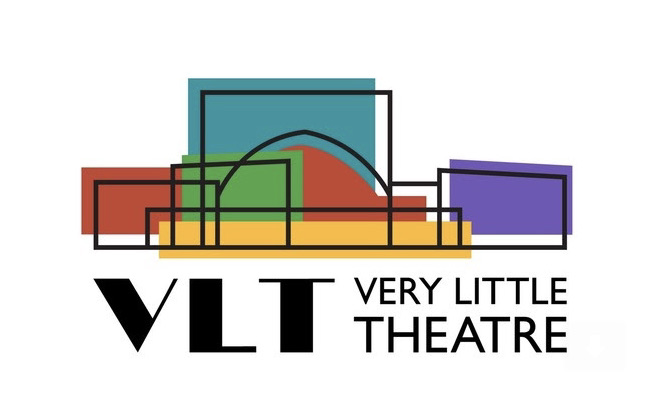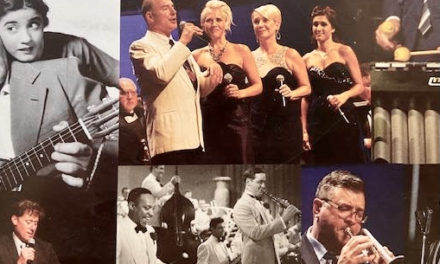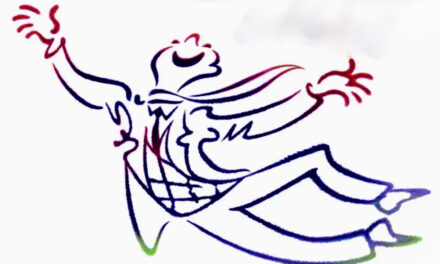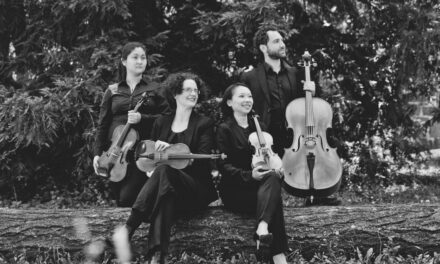By Kari Boldon Welch
The tagline for Very Little Theatre’s production of Thornton Wilder’s The Skin of Our Teeth reads “Because nothing says comedy like surviving the apocalypse” — and its audiences will indeed find humor within the absurdist romp that weaves together the Ice Age and the New Jersey suburbs, the Atlantic City Boardwalk and Noah’s Ark, the story of Cain and Abel and the nuclear family. The comedy is less slapstick and more cerebral, but it brings the audience in on every nuanced joke.
The phrase “the skin of my teeth” can be traced back to the biblical book of Job, roughly translated in the King James version as “My bone cleaveth to my skin and to my flesh, and I am escaped with the skin of my teeth.”
Job, as portrayed in the Bible, is a man who loses his wealth, his home, his family but maintains his faith and belief no matter the tragedies that befall him. As we are dropped into the rich, sometimes bizarre world of Thornton Wilder’s Pulitzer Prize-winning play The Skin of Our Teeth, we are introduced to the Antrobus family whose home, success, and very lives are threatened by apocalyptic tragedies and yet cling to hope so that the human race can begin again and again.
Thornton Wilder penned The Skin of Our Teeth as the United States entered into World War II. Surely the suspense and fear of the time influenced the work, but Wilder credits James Joyce’s Finnegans Wake as the inspiration. This may be the explanation for Wilder’s manipulation of time and space within the play. The first act opens on the New Jersey home of George and Maggie Antrobus (played by Dave Smith and Denise LaCroix), where it is August and the coldest day of the year as the Ice Age draws near threatening the extinction of all living creatures.
Wilder leans heavily into biblical and mythological threads throughout The Skin of Our Teeth without being didactic or moralistic. They serve more as a point of reference for the audience within our own collective knowledge of literature and storytelling. Mr. and Mrs. Antrobus could be Adam and Eve; indeed, they have been married thousands of years and their son Henry (Anthony C. Edwards) has had to change his name. It had been Cain and, it seems, the Antrobus family is down one son. The family is completed with a daughter, Gladys (Ashley Ecker). Joining the journey from apocalypse to apocalypse is Lily Sabina (Leslie Murray), maid and temptress and warrior. The character seems to be both a nod to the Talmudic figure of Lilith and the Sabine women of Roman mythology.
The story is told with the help of a cast of eight additional actors playing everything from a dinosaur (Vanessa Norman) to a fortune teller (Denise Jackson) to Homer (William Campbell) himself.
The action of the play starts with a monologue from Sabina giving background, place, and time much like a Shakespearean play might spell out the details. However, the play is soon interrupted when the actress playing Mrs. Antrobus does not make her cue and the Stage Manager (Scott Smith) must encourage the actress playing Sabina to ad lib. We have stumbled into a play within a play. Wilder breaks the fourth wall often throughout The Skin of Our Teeth, directly addressing the audience as we come to know these characters not just as the storytellers but as the actors behind the storytellers.
Director Rebecca Lowe delivers the complexity of the production with deft management of pacing and careful building of each character. Lowe finds inspiration in a poem that is mentioned in the first act as the first apocalypse is drawing nigh. The Light of Stars by Henry Wadsworth Longfellow describes the draw of the red planet Mars, and from that Lowe has peppered the production with delightful Easter eggs. The color red and red spheres, representing the symbolism in the mythology Wilder has woven into the play, are waiting to be mined by clever audiences. One might need to catch the show twice to spot them all.
Leslie Murray gives a solid performance as Lily Sabina leading the cast with enthusiasm and engaging the audience with aplomb. By Act III, the richest and deepest of the three acts, she has settled the audience in to the roller coaster ride, and we all are leaning in to where it is taking us next. Denise LaCroix is motherly and yet authoritative as Mrs. Antrobus and Dave Smith presents Mr. Antrobus as a bumbling genius. Ashley Ecker’s voice as the simpering Gladys is perfectly childlike without being cloying. Anthony C. Edwards gives a standout performance as Henry, moving from a young, troubled kid to an adult struggling with his relationship to right and wrong. Scott Smith as stage manager copes with building frustration as he tries to control a production that threatens to go off the rails. The ensemble supports at every turn with a particularly funny performance by Larry Fried as Fred Bailey in Act III.
The set design by Carol Dennis is simple and effective. Sarah de Leon, local burlesque dancer and producer, brings in a bit of the ’60s style through a dance performance that covers the change from Act I to Act II so perfectly that the scene shift feels like magic. Costume designers Paula Tendick and Gail Rapp deliver a palette of colors and textures that bring out the best in each character. Lighting design by Mollie Skye effectively sets the mood for each act.
In the end, we find Sabina and Mr. Antrobus grappling with what comes next: searching for the will to rebuild and the hope to begin again. This is the resonance that we as a community are grappling with ourselves. We have all just lived through the brink of tragedy, the shuttering of our society through the pandemic. We continue to live with the shadow of climate change and the heat dome that has covered much of our world.
The picking up and moving forward is particularly felt in the theater world as each week established theaters across the nation shut their doors for good because of audiences that have not returned. It is difficult to find the hope to press on and continue to bring art into the world. This production and cast and crew within it have embraced this absurd world and play it with such joy and risk with the hope that the audience will come to see what they have built.
Their risk and hope deserve an audience to witness the journey.
The Skin of Our Teeth continues at The VLT
When: Evenings at 7:30 p.m. on Aug. 10-11, 17-18-19; with 2 p.m. matinees on Aug. 13 and 20
Where: The Very Little Theatre, 2350 Hilyard St., Eugene
Tickets: $20-$26, available at 541-344-7751 or online at thevlt.com
Covid Protocol: For the health and safety of our audience, cast and crew, The Very Little Theatre encourages all attendees to be mindful of their fellow theatergoers while inside the venue. VLT may adapt measures as needed, based on changing conditions.








